Three in four Australians believe mental and physical health are equally important, but still think more about their physical health
Three in four Australians believe their mental and physical health are equally important but spend more time thinking about their physical wellbeing, a new Ipsos survey has revealed.
More than half of Australians surveyed said they ‘often’ think about their mental wellbeing, but almost three in four ‘often’ think about their physical wellbeing. This disparity exists despite the fact that three in four Australians surveyed believe their mental and physical health are equally important.
The results are part of the annual global Ipsos World Mental Health Day survey, which is designed to examine the public’s perceptions and experiences around mental health. Topics include how mental health relates to physical wellbeing, how people talk about mental health issues, and how healthcare services manage mental health conditions. The survey was conducted in 34 countries between 22nd July and 5th August 2022 on Ipsos’ Global Advisor online platform.
Key Australian findings:
- When people were asked to think about their top health concerns, mental health (global average 44%) was ranked second and much higher than cancer (34%). Coronavirus held top position with 62%.
- More than half (54%) of people surveyed said they “often” think about their mental wellbeing, which is in-line with the global average (58%).
- Almost three in four (72%) said they ‘often’ think about their physical wellbeing, compared to 70% globally.
- On average, 73% of Australians said their mental and physical health were equally important, compared to 76% globally. However, just over a third (33%) said health services in Australia treated the conditions equally.
- A little under half (45%) said physical health was given more priority than mental health by healthcare services, with just 13% believing mental health receives more attention.
- Nearly six in ten (59%) indicated they felt stressed to the point where it had an impact on their daily life more than once in the past year, with people under 35 (44%) and women most likely to have experienced this several times (41%).
- Australia is on par with the global country average for effects of stress, however Australians have the second highest incidence globally of talking to their primary healthcare provider about their mental health (25%, compared to 14% globally).
Ipsos Australia Senior Research Manager, Nonie Finlayson, said: “The findings highlight there is equal value placed on mental and physical wellbeing globally, but people believe our health services are lagging in addressing mental health conditions. However, we are seeing a disconnect between attitudes and behaviour, with people thinking about their physical wellbeing far more often than their mental health. It’s not clear whether this reflects a lag between what we have traditionally done and our more modern views about mental health, or perhaps our behaviour is a reflection of healthcare services, particularly perceptions around the greater importance being placed on physical health.
“The growing momentum around awareness and importance of mental wellbeing, being led by young people, points to the need for funding and policies at the highest levels to support citizens. Now is an opportune moment, as we emerge out of the pandemic, to prioritise supporting mental health initiatives.”
Key global findings:
- When people were asked to think about their top health concerns, mental health (global average 36%) was ranked higher than cancer (34%) for the first time ever.
- More than half (58%) of people surveyed said they “often” think about their mental wellbeing.
- On average, 76% said their mental and physical health were equally important. But only 33% said the health services in their country treated them equally
- Just over two-fifths (41%) said physical health was prioritised over mental health by healthcare services, with just 12% saying mental health receives more attention.
- Generally speaking, mental health issues were felt more strongly by people under 35, women, and low-income households.
Thinking about our mental and physical wellbeing
Globally, 58% of those surveyed think about their mental wellbeing either very or fairly often - five percentage points higher than in 2021. On the other hand, thinking around physical wellbeing was two points higher, on average, at 70%. Globally, those thinking about their mental and physical wellbeing has increased since 2021; in Australia, it was two points lower for mental health (54%) and one point lower for physical health (72%).
The proportion of people thinking about their mental wellbeing “often” shows some differences by country, with Portugal (82%) ranking first, followed by Brazil (76%) and South Africa (75%), down to 33% in China.
Q: How often, if at all, would you say you think about your mental wellbeing?
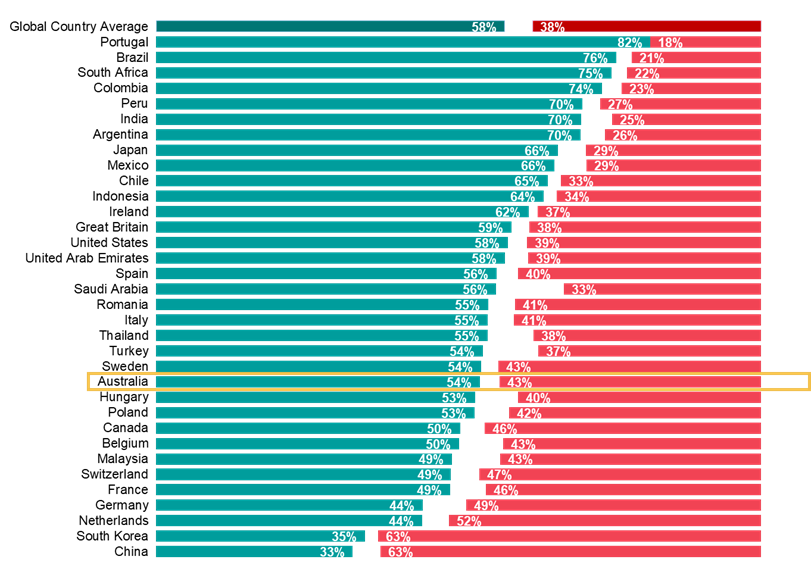
Mental vs Physical Health – which takes priority?
The perceived importance of mental and physical wellbeing seems to cross borders, with nearly eight in 10 globally ranking them both equal (76%). Of the 34 countries surveyed, 30 had more than seven in 10 saying mental and physical wellbeing were equally important. There were only four countries that were exceptions, (two of which still had it at over half): Thailand (66%), Saudi Arabia (54%), India (49%), and the UAE (48%). However, Saudi Arabia, India, and the UAE had the highest proportion of people saying mental health was more important than physical health.
Q: Thinking about your own health, do you think that mental health or physical health is more important, or are they equally important?
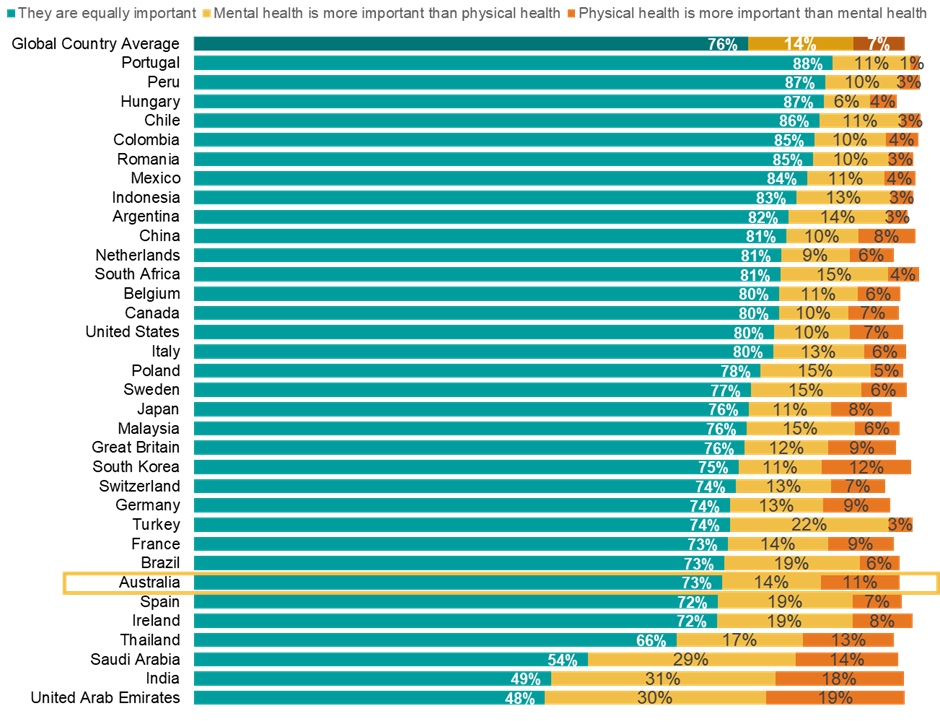
Health Services perceived vs experienced
The Ipsos survey shows the public believes mental and physical wellbeing are equally important. But do peoples’ healthcare systems reflect this view and provide equal treatment? Globally, a third (33%) of people believe both are treated equally. Only 12%, on average, think mental health is given more priority; this contrasts with 41% who said their healthcare system focuses more on physical health.
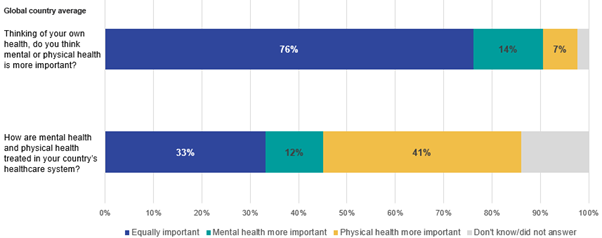
The country with the biggest perceived imbalance was Portugal (73% said physical was given more importance than mental health), with Sweden next at nearly three-fifths (58%). The countries with the highest perception of mental health being treated more importantly than physical health were also the same countries with the highest proportion saying mental health should have more priority than physical health: India (27%), Saudi Arabia (25%), and the UAE (24%).
Experiences over the last year
The effects of stress on daily life were the most frequently reported mental health issues globally, with 63% saying they had felt (at least once) stressed to the point where it had an impact on how they lived their daily life over the last year. Stress has also made three-fifths (59%) feel like they can’t cope with things, and two-fifths (39%) felt they couldn’t go to work at least once. A quarter said they considered suicide or self-harm once in the last year.
Australia is on-par with the global average for the effects of stress, however, as a country, Australia has the second highest incidence of people talking to their primary healthcare provider about their mental health (25% for Australians, compared to 14% globally). India has the highest incidence at 29%.
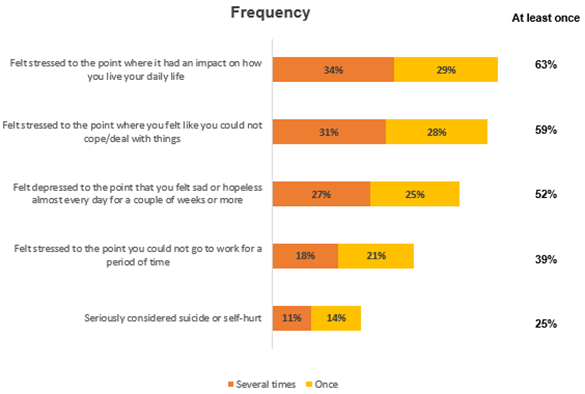 These issues are most pertinent among people under 35, women, unmarried people, and low-income households.
These issues are most pertinent among people under 35, women, unmarried people, and low-income households.
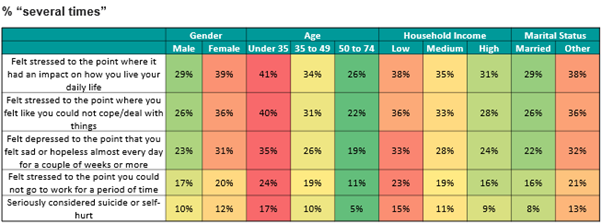
About the Study
This study did not have any external sponsors or partners. It was initiated and run by Ipsos, because we are curious about the world we live in and how citizens around the globe think and feel about their world.
These are the results of a 34-country survey conducted by Ipsos on its Global Advisor online platform. Ipsos interviewed a total of 23,507 adults aged 18-74 in the United States, Canada, Malaysia, South Africa, and Turkey, 20-74 in Thailand, 21-74 in Indonesia, and 16-74 in 27 other markets between Friday, July 22 and Friday, August 5, 2022.
The sample consists of approximately 1,000 individuals in each of Australia, Brazil, Canada, mainland China, France, Germany, Great Britain, Italy, Japan, Spain, and the U.S., and 500 individuals in each of Argentina, Belgium, Chile, Colombia, Hungary, India, Indonesia, Ireland, Malaysia, Mexico, the Netherlands, Peru, Poland, Portugal, Romania, Saudi Arabia, South Africa, South Korea, Sweden, Switzerland, Thailand, Turkey, and the United Arab Emirates.
The samples in Argentina, Australia, Belgium, Canada, France, Germany, Great Britain, Hungary, Italy, Japan, the Netherlands, Poland, South Korea, Spain, Sweden, Switzerland, and the United States can be taken as representative of these countries’ general adult population under the age of 75.
The samples in Brazil, Chile, China (mainland), Colombia, India, Malaysia, Mexico, Peru, Russia, Saudi Arabia, Singapore, South Africa, and Turkey are more urban, more educated, and/or more affluent than the general population. The survey results for these markets should be viewed as reflecting the views of the more “connected” segment of their population.
The data is weighted so that each market’s sample composition best reflects the demographic profile of the adult population according to the most recent census data.
The ‘Global Country Average reflects the average result of all the countries and markets where the survey was conducted that year. It has not been adjusted to the population size of each country or market and is not intended to suggest a total result.
Where results do not sum to 100 or the ‘difference’ appears to be +/-1 more/less than the actual, this may be due to rounding, multiple responses or the exclusion of don't knows or not stated responses.
Sample surveys and polls may be subject to sources of error, including, but not limited to coverage error, and measurement error. The precision of the online surveys conducted is measured using a Bayesian Credibility Interval. Here, the Australian results have a credibility interval of +/-3.5 percentage points. For more information on the Ipsos use of credibility intervals, please go to: https://www.ipsos.com/sites/default/files/2017-03/IpsosPA_CredibilityIntervals.pdf
The publication of these findings abides by local rules and regulations.

